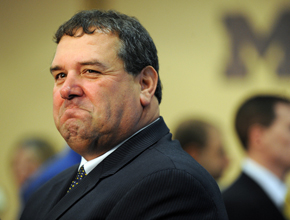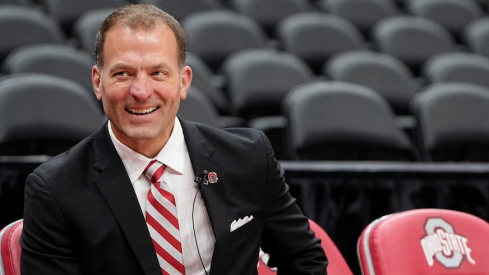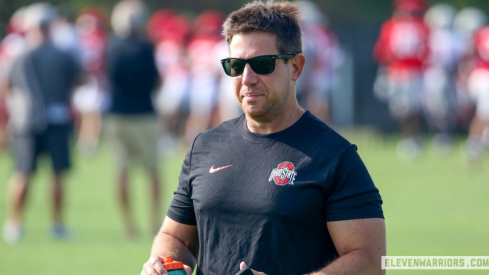 Did he ever have a chance?
Did he ever have a chance?I have a confession to make…I have friends who are Michigan fans. I’m not talking casual observers of the sun maize and blue, I’m saying die-hard, terrible, awful, no good Michigan fans. To my credit, it’s not entirely my fault. They told me too late in the friending process for me to turn back. So, I had to grit my teeth, bear it and keep them around.
One friend in particular is a complete UM disciple. The guy lives and breathes Michigan Football. As you can imagine this has resulted in more OSU-UM related arguments, taunt-fests (by this I mean me taunting him for the majority of the past 10 years) and incoherent bar babbles than I can count.
Fortunately, for a guy who could be so dumb when choosing a football team, he’s actually pretty smart. Our conversations (while riddled with creative insults and chest-thumping) are informative. We give one-another a glimpse behind enemy lines we wouldn’t have been afforded had I stuck to my strict rule of staunchly refusing the friendship of any UM fan, then egging their house for good measure.
One topic that’s come up recently is the difference between Hoke and Rich Rod. Specifically, how was Hoke able to enjoy a level of success in his first year that Rodriguez never came close to sniffing in three?
It’s an interesting question that only becomes more intriguing considering the players on the field are essentially the control group. Hoke was able to win with most of the same players Rodriguez had. So what happened?
After extensive conversation with my dumb friend and doing a little digging on my own I think Hoke’s success or Rich Rod’s lackthereof can be boiled down to three key factors:
1. Institutional Support: Hoke was Welcomed Rich Rod Wasn’t This point has been covered extensively by author John Bacon in his book Three and Out. Bacon, who was given unprecedented access to the team during Rodriguez’s tenure, arrived with the intention of writing a book on Rich Rod’s early career at Michigan. The piece ended up being a tell-all exposé on the demise of the Michigan program.
While my top-level analysis won’t do the 400+ page piece justice, the essence of one of Bacon’s themes is: Rich Rod wasn’t welcomed by UM bigwigs from the beginning. Specifically, Associate AD Lloyd Carr did everything short of holding a press conference to voice his displeasure over the Rodriguez hire.
MGoBlog does a nice job of summarizing Carr’s efforts to undermine Rodriguez including informing former players he would sign transfer papers, telling Ryan Mallett he “needed to leave” and refusing to stand-up for Rodriguez during the media firestorm following Michigan’s terrible 2008 3-9 season (Rich Rod’s first as head coach).
 Michigan Man?...Gross
Michigan Man?...GrossCarr’s displeasure with the hire, coupled with what some were calling a Rich Rod Jihad by Detroit Free Press Columnist Michael Rosenberg (over the excessive-exercising spat with the NCAA) seemingly doomed Rodriguez from the start.
In stark contrast, Hoke hasn’t had to deal with any of this backlash, largely because of the following factor.
2. Hoke is a “Michigan Man” Rodriguez Wasn’t The term “Michigan Man” is vague at best. I always thought it meant you were ugly, but apparently it’s got a different meaning to those trolls up North. Definitions of Michigan Man vary, but from what I can gather it means being like Bo Schembechler: a hard-nosed, three yards and a cloud of dust kind of guy. It’s a revered phrase and one that UM takes seriously. So, when Rich Rod arrived in 2008 with his fancy WVU spread, it was seen as less than hard-nosed and anything but “Michigan-Mannish”.
Compounding the problem was the fact that Rich Rod didn’t understand the phrase and/or was not prepared by the Michigan Athletic Department to field questions on the topic. This ultimately coalesced in RR answering in a press conference with a, “Gosh, I hope not! They hired me!”, when asked if the Michigan coach had to be a Michigan Man. As you can imagine, that didn’t sit well.
A significant amount of Michigan Man reputation management occurred after that now infamous statement. But, the damage was already done. The aforementioned author Bacon, in an interview with MGoBlog, explains:
“At the “Victors’ Rally” held in February 2010, Rodriguez wanted to show that he’d gotten the message. So, he closed his speech by saying, “I’m Rich Rodriguez, and I am a Michigan Man.” This time, he was criticized for being presumptuous…"
Then during his last speech:
“Finally, with great humility, he told the crowd at his final speech at the Bust in December 2011, “I hope you realize, I truly want to be a Michigan Man.” But this time his critics said a true Michigan Man wouldn’t have to ask.”
Rodriguez wasn’t a Michigan Man, Hoke is. From calling Ohio State “Ohio” to his “This is Michigan FerGodSakes”, everything Hoke has done over the past year was seen as fitting the Michigan Man mold. Because of this, Hoke was allowed to operate free of much of the static Rich Rod had to work around. (It also helps that Hoke beat Ohio State….even though it was in a down year with an interim head coach…but I digress)
3. Defensive Coaching Staff: Hoke Has One…Did Rich Rod? Last and possibly most important, Hoke understands you can’t win in the Big Ten without defense. This is a concept Rich Rod failed to grasp during his three years at the helm of the program.
Despite what went down at UM, Rodriguez is still an offensive guru. The problem with being amazing at the X’s and O’s on the scoring side of the ball is that you generally aren’t great at scheming on the defensive end. This is why Rodriguez NEEDED a competent defensive coordinator. Instead he chose to hire Scott Shafer who engineered these gems in 2008: gave up 45 points to Illinois, 46 points to Penn State, 48 points to Purdue, and 42 points to OSU.
Shafer was promptly fired and replaced by Greg Robinson. At no one's behest, Robinson decided to follow in his predecessor's footsteps, managing brilliant 2009-2010 defensive campaigns. In 2009 the Wolverines gave up 35 points to Penn State, 38 points to Illinois, 38 points to Purdue and 45 points to Wisconsin (these were all back-to-back). In 2010 the good times kept on a rollin’ as Robinson’s Swiss cheese boys gave up 41 points to Penn State, 48 points to Wisconsin and 52 points to Mississippi State in the Gator Bowl. Iron curtain they were not. At the end of the day I guess rubbing players’ faces with a stuffed beaver (I wish I was making this up) isn’t the best motivational tool.
On the other hand, Hoke has done his due diligence on the defensive end. To start, he’s already a defense guy. He played LB at Ball State and then went on to hold defensive coaching positions from 1981-2002. For good measure, he hired Greg Mattison, former DC for the Baltimore Ravens (who have an OK defense the last time I checked).
Ultimately this resulted in a two loss season, with both losses appearing respectable in comparison to the Rich Rod years (i.e. not giving up nearly half-a-hundred each week).
Hoke’s success and Rodriguez’s demise are in many ways linked. Hoke was given a level of institutional support that Rich Rod never received. This was largely because Hoke understood how to play nice with the brass i.e. exemplify qualities of a “Michigan Man”. Able to do his job free of outside noise (a nicety Rodriguez was never afforded) Hoke went on to do it well. Unlike Rich Rod, he understood you can’t expect to outscore opponents week-in and week-out in the Big Ten. Therefore, he put together a respectable defensive philosophy and staff to bolster an already explosive offense.
It’s hard to sum up all of this succinctly, but surprisingly my stupid friend does a decent job:
“All of this annoyed me at first, because I thought Hoke was a lackluster hire and still think Rodriguez is a great coach. But Hoke coached brilliantly in his first season…His staff adapted to the personnel on offense pretty damn well. The younger fans such as myself appreciate that, while the older guys like that he talks like Bo.”
Well there you have it. Have you ever hated Michigan more? Me neither. Keep calm and carry on.

